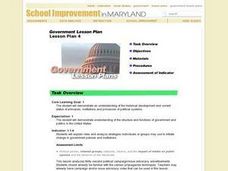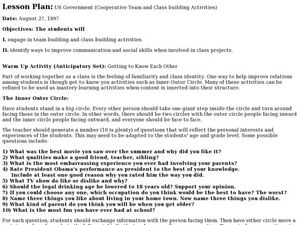Curated OER
The Role of the Government in Lead Poisoning Prevention
Students examine a general overview of the issues around lead poisoning in order to become more aware of the dangers and effects it has on the human body. They investigate how and why various government agencies and laws were...
Curated OER
Participation in Local and State Government
Students investigate the state and local levels of government. They demonstrate an examineing of government at these levels. The identification of officials and resources can be used for assessment.
Curated OER
Where Does the Government Get Its Authority?
Students discuss elected and appointed officials and identify figures of authority. They complete a worksheet to explain that governments provide for organization and safety.
Curated OER
Government Lesson Plan: Lesson Plan 4
Pupils analyze how interest groups present their viewpoint to the public. They assess how media can influence public opinion by closely examining a political ad from the 1964 presidential election.
Curated OER
Who's Who in Government: Past, Present and Future
Twelfth graders research a list of governmental leaders of South Carolina's past and present. They briefly identify each by writing a short summary which includes the dates of their political career, party affiliation, positions held in...
Curated OER
Heritage: What Would You Take?
Fifth graders explore their own definitions of valuable, and decide what they would choose to take with them if they could only take one item. They define the reasons their items are valuable to them.
Curated OER
Political Asylum Talk Show
Learners view videos, visit websites, and read about the nature and changes made to the idea of political asylum. Beginning with Jewish refugees fleeing Nazi Germany, they will explore policy change throughout the years. The lesson...
Curated OER
Understanding Tiananmen Square
William Bell's Forbidden City is used as the basis of a study of China, Chinese culture and government, and especially of the events in Tiananmen Square in 1989. Class members select a topic for Internet research and then prepare a...
Curated OER
Parallel Timelines
Twelfth graders research the history of how a particular environmental issue moves through the Conservation Movement. They create timelines that show the progression of public sentiment and the legislation about the issue.
Curated OER
ONE VOTE
In order to understand the political process and the importance of voting, pupils will construct a class time line. They will group up and research a specific era, creating a time line of political events where one vote made a...
Curated OER
Cleveland May Gamble on Gambling
Pupils read articles, both pro and con, about a city proposing to approve gambling. They discuss the biases of the articles then interview parents and community members about the issue. They work in small groups to develop either a pro...
Curated OER
First Grade Visits...Washington DC
Take your first graders on a virtual trip to around Washington, DC. This presentation provides illustrated slides featuring a map showing the location of Washington, DC, the White House, and some of the more famous memorials and...
Curated OER
How is Our Government Organized?
Students explore rights of their clients. In this constitutional law lesson, students play an online game that requires them to review individual cases in order to determine the rights their clients have.
Curated OER
Locke, Rousseau, the "State of Nature," and the Social Compact
In this Enlightenment worksheet, students read a paragraph and visit the noted Web sites to find the information to respond to 10 short answer questions about the philosophy and philosophers of the era.
Curated OER
Progressivism: What's the Problem?
Eighth graders interpret historical evidence presented in primary and secondary resources. In this Progressive Era lesson, students examine the goals and accomplishments of the Populist Party.
Curated OER
US Government (Cooperative Team and Class-building Activities)
Students participate in team-building activities. In this class identity lesson, students participate in activities and discussion that are intended to improve relationships between students.
Curated OER
History and Government of the United States
In this U.S. worksheet, students take notes in a graphic organizer as they read several passages, then answer four comprehension questions.
Curated OER
What Makes the Writer Write?
Students study Charles Dickens's Great Expectations to gain insight into a classical piece of fiction and to explain how writers respond to social conditions. They also consider how that response is important today.
Curated OER
End of the Line: What Happened to the Blue Ridge Railroad?
Sixth graders study the westward expansion and the role of railroad construction to the expansion. In this railroad history lesson, 6th graders complete KWL activity for the topic. Students view a PowerPoint about the growth of railroads...
Curated OER
Math: What's My Rule?
Second graders discuss the reasons for rules after reading Clean Your Room, Harvey Moon. Connecting the need for rules to math, they play a game called What's My Rule? using spinners to apply operations to given numbers. Working in...
Curated OER
A Country’s Shape Is More Than Its Borders
In this geography skills instructional activity, students read an article and examine graphs about population prior to answering 13 short answer questions and 10 multiple choice questions. Students then respond to the writing prompt...
Curated OER
What Time Is It?
In this telling time to the hour worksheet, students analyze 4 clocks and figure out what time each displays. Students cut out 4 digital times and paste them correctly underneath the clocks.
Curated OER
California
For this California worksheet, students respond to 7 questions that are related to the state of California. First, they identify and name the state's capital and when it became a state. Then, students identify and name the state's motto,...
Curated OER
The Government and Natural Rights
Students are introduced to some basic ideas the Framers used in creating the kind of government they thought would best protect the natural rights of each individual and promote the good of all. At the conclusion of the lesson, they know...

























